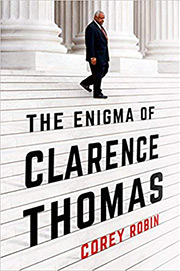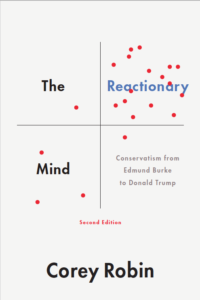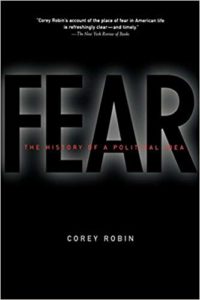Books
The Enigma of Clarence Thomas

The Enigma of Clarence Thomas is a groundbreaking revisionist take on the Supreme Court justice everyone knows about but no one knows.
Most people can tell you two things about Clarence Thomas: Anita Hill accused him of sexual harassment, and he almost never speaks from the bench. Here are some things they don’t know: Thomas is a black nationalist. In college he memorized the speeches of Malcolm X. He believes white people are incurably racist.
In the first examination of its kind, Corey Robin – one of the foremost analysts of the right – delves deeply into both Thomas’s biography and his jurisprudence, masterfully reading his Supreme Court opinions against the backdrop of his autobiographical and political writings and speeches. The hidden source of Thomas’s conservative views, Robin shows, is a profound skepticism that racism can be overcome. Thomas is convinced that any government action on behalf of African-Americans will be tainted by racism; the most African-Americans can hope for is that white people will get out of their way.
There’s a reason, Robin concludes, why liberals often complain that Thomas doesn’t speak but seldom pay attention when he does. Were they to listen, they’d hear a racial pessimism that often sounds similar to their own. Cutting across the ideological spectrum, this unacknowledged consensus about the impossibility of progress is key to understanding today’s political stalemate.
The Reactionary Mind
 Late in life, William F. Buckley made a confession to Corey Robin. Capitalism is “boring,” said the founding father of the American right. “Devoting your life to it,” as conservatives do, “is horrifying if only because it’s so repetitious. It’s like sex.” With this unlikely conversation began Robin’s decade-long foray into the conservative mind. What is conservatism, and what’s truly at stake for its proponents? If capitalism bores them, what excites them?
Late in life, William F. Buckley made a confession to Corey Robin. Capitalism is “boring,” said the founding father of the American right. “Devoting your life to it,” as conservatives do, “is horrifying if only because it’s so repetitious. It’s like sex.” With this unlikely conversation began Robin’s decade-long foray into the conservative mind. What is conservatism, and what’s truly at stake for its proponents? If capitalism bores them, what excites them?
Tracing conservatism back to its roots in the reaction against the French Revolution, Robin argues that the right is fundamentally inspired by a hostility to emancipating the lower orders. Some conservatives endorse the free market, others oppose it. Some criticize the state, others celebrate it. Underlying these differences is the impulse to defend power and privilege against movements demanding freedom and equality.
Despite their opposition to these movements, conservatives favor a dynamic conception of politics and society–one that involves self-transformation, violence, and war. They are also highly adaptive to new challenges and circumstances. This partiality to violence and capacity for reinvention has been critical to their success.
Written by a keen, highly regarded observer of the contemporary political scene, The Reactionary Mind ranges widely, from Edmund Burke to Antonin Scalia, from John C. Calhoun to Ayn Rand. It advances the notion that all rightwing ideologies, from the eighteenth century through today, are historical improvisations on a theme: the felt experience of having power, seeing it threatened, and trying to win it back.
Fear
 For many commentators, September 11 inaugurated a new era of fear. But as Corey Robin shows in his unsettling tour of the Western imagination—the first intellectual history of its kind—fear has shaped our politics and culture since time immemorial.
From the Garden of Eden to the Gulag Archipelago to today’s headlines, Robin traces our growing fascination with political danger and disaster. As our faith in positive political principles recedes, he argues, we turn to fear as the justifying language of public life. We may not know the good, but we do know the bad. So we cling to fear, abandoning the quest for justice, equality, and freedom. But as fear becomes our intimate, we understand it less. In a startling reexamination of fear’s greatest modern interpreters—Hobbes, Montesquieu, Tocqueville, and Arendt—Robin finds that writers since the eighteenth century have systematically obscured fear’s political dimensions, diverting attention from the public and private authorities who sponsor and benefit from it. For fear, Robin insists, is an exemplary instrument of repression—in the public and private sector. Nowhere is this politically repressive fear—and its evasion—more evident than in contemporary America. In his final chapters, Robin accuses our leading scholars and critics of ignoring “Fear, American Style,” which, as he shows, is the fruit of our most prized inheritances—the Constitution and the free market.
With danger playing an increasing role in our daily lives and justifying a growing number of government policies, Robin’s Fear offers a bracing, and necessary, antidote to our contemporary culture of fear.
For many commentators, September 11 inaugurated a new era of fear. But as Corey Robin shows in his unsettling tour of the Western imagination—the first intellectual history of its kind—fear has shaped our politics and culture since time immemorial.
From the Garden of Eden to the Gulag Archipelago to today’s headlines, Robin traces our growing fascination with political danger and disaster. As our faith in positive political principles recedes, he argues, we turn to fear as the justifying language of public life. We may not know the good, but we do know the bad. So we cling to fear, abandoning the quest for justice, equality, and freedom. But as fear becomes our intimate, we understand it less. In a startling reexamination of fear’s greatest modern interpreters—Hobbes, Montesquieu, Tocqueville, and Arendt—Robin finds that writers since the eighteenth century have systematically obscured fear’s political dimensions, diverting attention from the public and private authorities who sponsor and benefit from it. For fear, Robin insists, is an exemplary instrument of repression—in the public and private sector. Nowhere is this politically repressive fear—and its evasion—more evident than in contemporary America. In his final chapters, Robin accuses our leading scholars and critics of ignoring “Fear, American Style,” which, as he shows, is the fruit of our most prized inheritances—the Constitution and the free market.
With danger playing an increasing role in our daily lives and justifying a growing number of government policies, Robin’s Fear offers a bracing, and necessary, antidote to our contemporary culture of fear.